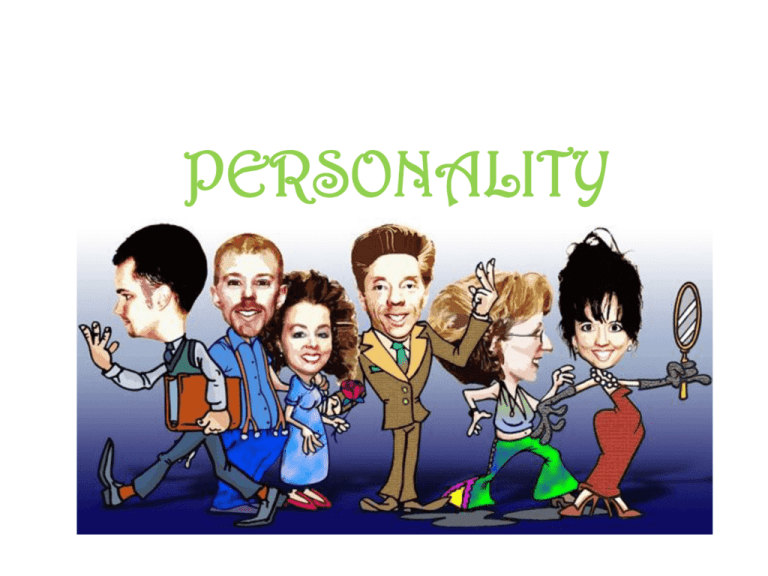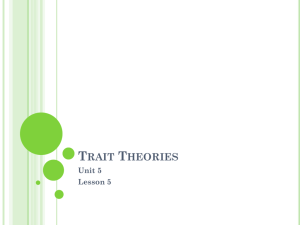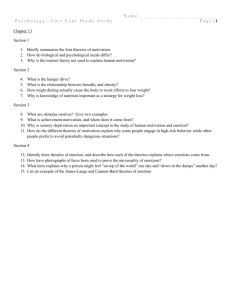Unit 4 Personality Intro - Introduction to Human Behavior
advertisement

PERSONALITY Definition of Personality – individual’s unique pattern of thoughts, feelings, and behaviors – persists over time, across situations – Unique differences – Relatively stable and enduring Four Major Types of Personality Theories • Psychodynamic Theory: views personality as the result of unconscious, often sexual motivations and conflicts • Freud • Neo-Freudians (Jung, Adler, Horney, Erikson) Four Major Types of Personality Theories • Humanistic Theory: emphasize the role of positive growth motives and the realization of potential in shaping personality. • Carl Rodgers Four Major Types of Personality Theories Social-Cognitive Theory: finds the roots of personality in the ways people think about, act on, and respond to their environment. -personal expectancies -locus of control -learn from experiences -Behaviorism! (B.F. Skinner) -Albert Bandura Four Major Types of Personality Theories • Trait theories: focus on categorizing and describing the ways in which people’s personalities differ. -subjective -done through extensive personality tests -you can assess your own personality by describing yourself! -Gordon Allport—OCEAN—BIG 5 test Trait Theory • Concentrates on how adult personalities are different, not how they develop • Traits are the building blocks of personality • Traits cannot be seen but they can be inferred from behavior Problem: obviously subjective and descriptive, not scientific • Look at packet page 5 for more info… Gordon Allport-Trait Theorist • When he was 22, he traveled to Vienna. He had arranged to meet with the great Sigmund Freud! When he arrived in Freud’s office, Freud simply sat and waited for Gordon to begin. After a little bit, Gordon could no longer stand the silence, and he blurted out an observation he had made on his way to meet Freud. He mentioned that he had seen a little boy on the bus who was very upset at having to sit where a dirty old man had sat previously. Gordon thought this was likely something he had learned from his mother, a very neat and apparently rather domineering type. Freud, instead of taking it as a simple observation, took it to be an expression of some deep, unconscious process in Gordon’s mind, and said “And was that little boy you?” • This experience made him realize that psychology sometimes digs too deeply… Trait Theory: Gordon Allport • Organized all human traits into 5 main categories- Allport’s OCEAN • Openness • Conscientiousness • Extraversion • Agreeableness • Neuroticism • What were your results? What is your opinion of the test? Brainstorm using the Trait Theory… • Can you brainstorm the following about yourself? – Any cardinal trait(s)? • Remember: Not everyone has a cardinal trait! – What are your central traits? – What are your secondary traits? • Essentially, presenting this is your trait theory assignment, described in one of two options on packet page 2! (due next Wednesday) Personality Paper: Due Tuesday @ midnight, hand in during class on Wednesday • Unit Assessment- paper (described on page 3) – You will be hearing many theories of personality and essentially, forming your own theory based on the thoughts of psychologists and your own personal experiences. • Details: – 2-3 pages, 2 outside sources and the use of your packet, intext citations, MLA format bibliography. – You must use turnitin.com by TUESDAY at midnight. The assignment is due regardless of your attendance on 4/10/12 OR 4/11/12. Bring a paper copy Wednesday to avoid a point deduction. Packet citation information: Morris, Charles G. Psychology: an Introduction. Upper Saddle River, N.J.: Prentice Hall, 1996. Print. In text: (Morris, 1996). • 2 additional sources needed! • Use in-text citation and a formal works cited!


